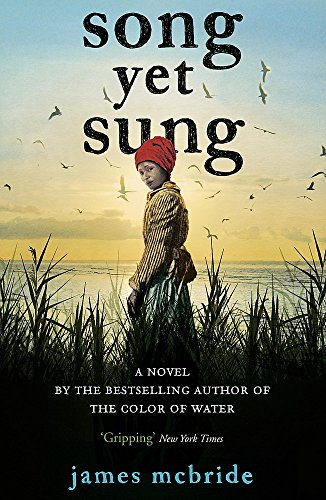Items related to Song Yet Sung

In the tense days before the American Civil War, in the swamplands of the Maryland shore, a wounded slave girl and her visions of the future tear a community apart in a riveting drama of hope and redemption.
Kidnappings, gunfights and chases ensue in this extraordinary story of violence, tragic triumph, and unexpected kindness.
'Gripping, affecting, and beautifully paced' - OPRAH MAGAZINE
'Escaped slaves, free blacks, slave-catchers, and plantation owners weave a tangled web of intrigue and adventure' - PUBLISHERS WEEKLY
"synopsis" may belong to another edition of this title.
In Denwood's grim, fatalistic pursuit of his destiny, McBride has fashioned a myth of retribution and sacrifice that recalls both William Faulkner's sagas of blighted generations and Toni Morrison's Song of Solomon. Explosively dramatic. (Kirkus starred review)
Gripping . . . One often risks turning the pages so fast as to miss some of the richness and subtlety of the writing. (New York Times)
By turns tender and savage, McBride's novel is a harsh commentary on the inequalities in society both past and present (Image magazine)
There were three prominent jazz musicians featured. Each was scheduled to speak for a short period. The first was a well-known Japanese trumpeter. He displayed an array of brilliant jazz licks for the packed room of dazzled students, explained the technique behind each of them, then happily retired to his seat, having impressed everyone. The second was a jazz arranger. He stood up, and using a blackboard and a student jazz trio, gave a long dissertation on the use of contrasting motion in jazz, open and closed voicings, and all kinds of complicated arranging business. He too received a huge round of applause, and retired to his seat.
The third and final participant was the late saxophonist Joe Henderson, who stood in a corner of the room, smoking a cigarette, wearing shades, and watching the whole business in silence.
When it was Henderson's turn, he produced his tenor saxophone, strode to the podium, turned to the student trio behind him, snapped, "Green Dolphin Street," and counted off the tune. The students leaped into the jazz standard. Henderson played for 45 minutes straight. One song. And every chorus was different. Each lick he offered was an eloquent compositional statement. It was like an out of body experience, watching him that closely. I heard and saw so much in those moments, it's hard to describe, but the most important thing I saw was a great artist kneeling before the altar of history.
When he finished, Henderson stepped off the podium, packed up his horn, and left the room without a word.
Best jazz workshop I ever saw.
And therein lies the rub.
I believe that what most novelists - with the exception of E.M. Forster and a few others - write about novels is junk. Novels are like jazz: complicated, intricately woven, full of trick turns and back door entrances and do's and don'ts and you missed a spot and you ought not to try it at home. But frankly, who can explain it? Other than the masters like Forster and Vonnegut and a few others, none of us knows what we are doing. When a novel is good, it goes down like a glass of water; everything is connected, there's a symmetry that you either feel or don't. I can't stand writers - or musicians, for that matter - who sit around analyzing each other's work. Get busy, I say. Write another book. Play another song. Count off the tune.
Song Yet Sung was inspired, in part, by the great Harriet Tubman, conductor of the famed Underground Railroad, who ferried more than 300 slaves to freedom. On a practical level, it grew out of the music that I sang in Baptist church as a boy. Songs like `Wade In The Water,' and `We Will Break Bread Together On Our Knees.' I had no idea those songs were codes to freedom, used by runaway slaves, and handed down from slavery to my generation. My aim in those days was to get out of the building as fast as possible. These days I thank God that I got into the building. Because that's where the stories are. In the music. And that's where this book was born.
So count it off.
"About this title" may belong to another edition of this title.
- PublisherSceptre
- Publication date2009
- ISBN 10 0340976438
- ISBN 13 9780340976432
- BindingPaperback
- Number of pages368
- Rating
Buy New
Learn more about this copy
Shipping:
£ 3.40
Within U.S.A.
Top Search Results from the AbeBooks Marketplace
Song Yet Sung
Book Description Paperback. Condition: new. New Copy. Customer Service Guaranteed. Seller Inventory # think0340976438

